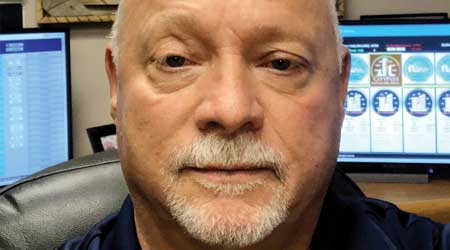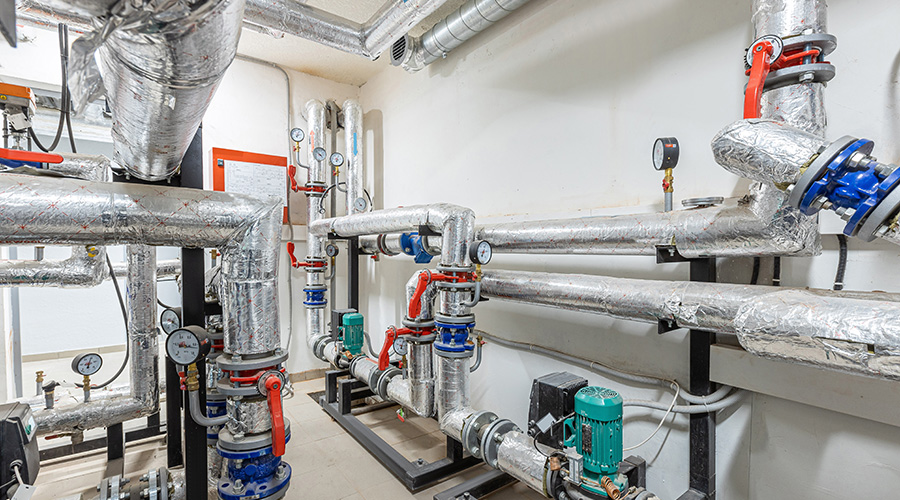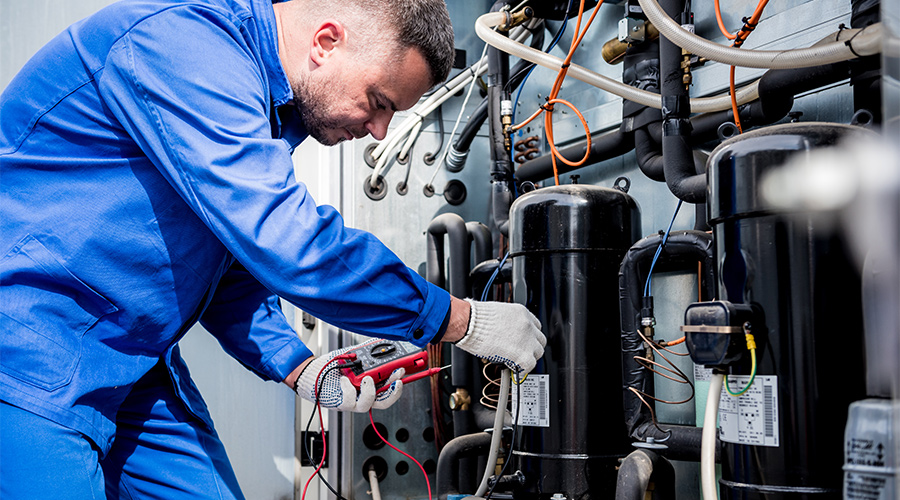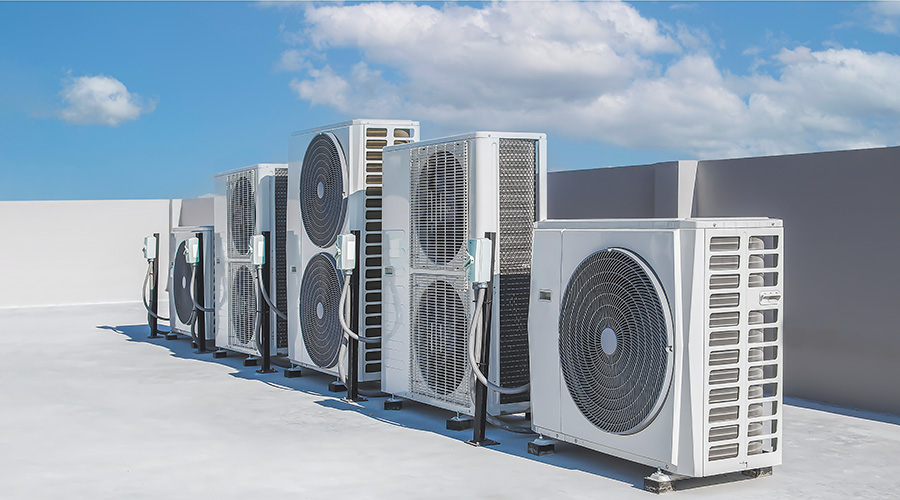 A boiler upgrade at CityPlex Towers in 2012 replaced an oversized 2,500 hp boiler with one 700 hp boiler and one 60 hp boiler. As a result of the project, the complex’s natural gas use has dropped by 71 percent.
A boiler upgrade at CityPlex Towers in 2012 replaced an oversized 2,500 hp boiler with one 700 hp boiler and one 60 hp boiler. As a result of the project, the complex’s natural gas use has dropped by 71 percent.Boiler Upgrade with a Healthcare Twist
Career experiences offered lessons that paid off when hospital-turned-office complex needed an upgrade for energy efficiency
By Ryan Berlin, Managing Editor
Where and when did you begin your career in institutional and commercial facilities?
King: In 1981, I started with the Williams Companies at the Williams Center in Tulsa, where I was lead maintenance technician for a 1.2 million-square-foot, 52-story tower. From 1995 through 2007, I was the maintenance manager for WorldCom, MCI, and Verizon, which is a 860,000 square-foot office with a 35,000 square-foot, raised-floor data center. From 2008 to 2010, I did project management for national accounts with Schneider Electric. In 2010, I started working for Oral Roberts University. I began managing the maintenance operation at the CityPlex Towers owned by ORU, and in 2013, I was promoted to director of energy management for both CityPlex Towers and the ORU campus.
What are your daily responsibilities?
King: I manage the utility budgets for 4.2 million square feet of campus buildings, office towers and medical space owned by Oral Robert University. Efficiency is a passion of mine, and it doesn’t matter if we are saving utility costs or labor. If we find a better way of doing something that we can save time doing, that’s my goal. Just because things have always been done a certain way doesn’t mean that’s the way we should continue to do it. I like looking to see if there are other opportunities and efficiencies to doing anything. The success that we have had at CityPlex Towers has given me the opportunity to look at the bigger picture for Oral Roberts University, and we have been successful at CityPlex, as well as on campus.
What credentials, certifications, licenses or other professional designations have you earned?
King:
• Associate’s degree in air conditioning, heating, and refrigeration from Oklahoma State University
• Mechanical contractor license from the state of Oklahoma
• First class engineer license from the city of Tulsa
• Boiler operator license from the Oklahoma Department of Labor
• Professional energy manager certification from the Institute of Energy Professionals. Technology continues to change, and these certifications allow us to stay at the forefront of those changes, and I love to learn.
What is your involvement with maintenance and engineering?
King: I work very close with the facility maintenance managers and the chief engineers for plant operations at the CityPlex Towers and ORU campus. Without the communication between all of us, I would not be able to manage utility costs. For example, in early 2018, the campus had a heating hot-water line start leaking underground, but no visual signs of the leak showed for months. The leak started at less than 1,000 gallons a day but increased as time went on. By July, the daily usage was 40,000 gallons daily but still no signs. We decided to dig around in areas where leaks had happened, and we were able to locate some water after digging a few holes. Several feet of the line were replaced, but the water usage for the last month before repairs was substantial, and sewer charges were also applied to the bill. By working with plant operations (and providing) detailed water usage amounts and photos showing the water was not going to the sewer system, we were able to get some adjustment to the sewer charge part of the bill. What is the best advice you’ve received in your career? King: When I started at CityPlex Towers in 2010, Mike Predovic with Trinity Properties who manages CityPlex Towers for ORU told me that we have a lot to get done, but it’s not a sprint. It’s a marathon. That turned out to be really good advice. There was and still is opportunity at every turn, but it is important not to move too fast.
What do you wish you had known before starting a career in facilities?
King: I wish I had a little better understanding that facilities operate 24/7 365 days a year, and when major problems occur, you must respond, regardless of the time of day.
What factors led you to undertake the boiler upgrade project?
King: Back in 2010 when I started here, we knew we had a need for a correction in our steam usage for the building. The existing two boilers were 2,000 horsepower (hp) boilers, and they would only turn down 4:1. Theoretically, you could turn it down to a 500 hp boiler, but we didn’t have near the usage to maintain even that during the summer months. Because we also have a hospital within the building, we needed the steam for usage other than heating. We had to run the boiler, and basically what they had been doing years prior to that was falsely loading it, which made the boiler more inefficient in order to keep it online. This boiler was so large it couldn’t be cycled on and off. One boiler is still in place (and) used as a backup. They were original boilers within the building, putting them at about 30 years old. When I got here in 2010, we were so inefficient in our operation that we had nowhere to go but up. In the years since, we have dropped our natural gas annual consumption by 71 percent, and that tells you how much waste there really was.
How have the newly installed boilers benefited the facility? King: The goal with this project was to rightsize it according to our need and to be able to let it modulate throughout its range and stay efficient. We were able to accomplish that with the 700 hp boiler because it has a 10:1 turndown, so it can turn down to 70 hp worth of load. At that point, it will cycle off. It will actually cycle off quite frequently and efficiently, where the bigger boilers just couldn’t do that efficiently.
How did the operations and activities within CityPlex Tower affect the planning and operation of the project?
King: Because we have a fully functional hospital within the complex, we had to provide steam year-round during the project. Basically, one of the two older boilers stayed online while we cut out and removed the other one and replaced it. We were very conscientious of not having a redundancy putting us at a risk. At no time could we not have steam pressure. The advantage of having two identical boilers and cutting one out was stockpiling the mechanical valves, motors and other parts from the one removed and having them for replacement parts in case we had a problem.
What role did you and your staff play in planning this project?
King: We had a consulting engineer we worked with when specifying. We had a lot of faith in his ability to help us get the right package for our need. I and our chief engineer toured the three boiler manufacturers that we had narrowed it down to, but we did quite a bit of research. There was almost a year from the time we secured the funding for the project to the time we placed an order on the boiler because of the changes that were being made throughout the complex. We were running a boiler that was so inefficient that we couldn’t rely on looking at just gas consumption. We didn’t know what our true load was, and we were changing it as we went. We found places where we did have leaky steam valves that were causing simultaneous heating and cooling, and we were making corrections. Up until this point, that wasn’t something that was really looked at closely. We were looking at the big picture and correcting all inefficiencies, and the size of the boiler kept dropping because we had determined we didn’t need all of that.
What challenges did you face during the planning and implementation of the project?
King: The size of the boiler based on getting it into the location — that was a big challenge. It had to come through an overhead door and drop 4 feet to the floor of the plant and then be moved past the original boiler, chillers and chilled-water lines. There were some things that had to be rerouted just to get the new boiler on its new pad. It was quite a challenge to get it in in one piece.
What lessons did you and your department learn from this project?
King: Patience. Like I said, just because we had secured the funding for the project, had we not been patient, we probably would have purchased more boiler than we needed. We went from a 2,000 hp boiler to a 700 hp boiler, thinking that we may have to go back to the original boiler under extreme cold weather. We haven’t found that to be the case, and the new boiler has handled our load since it’s been installed.
Has the project delivered the intended results?
King: In a five-year period, our annual gas consumption dropped 71 percent. During the same timeframe, because of the simultaneous heating and cooling and all of the other things we corrected, we dropped our electricity consumption by 50 percent, as well. To think about the process of going from one extreme to another, in the past four years, we have done an Energy Star rating on the building, and in our first year we scored a 92. We were just crossing our fingers. We just wanted to score the 70 to be certified. We had no idea where we were going to be. So the first year we scored a 92. Two years in a row after that, we scored a 93, and this last year, we just got our rating, and it was a 94. We went from one extreme to another.
Related Topics:












